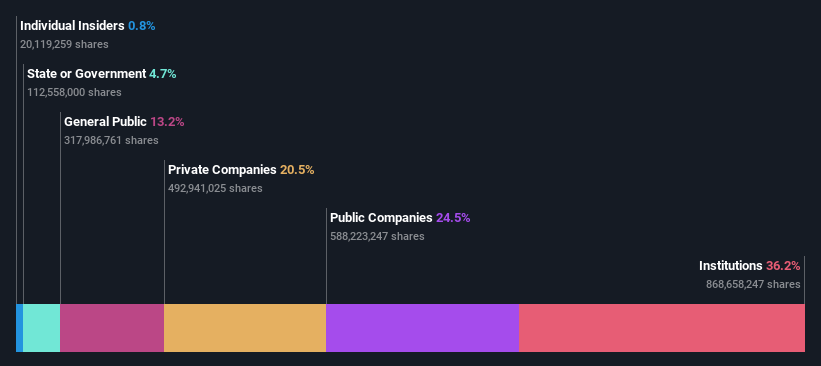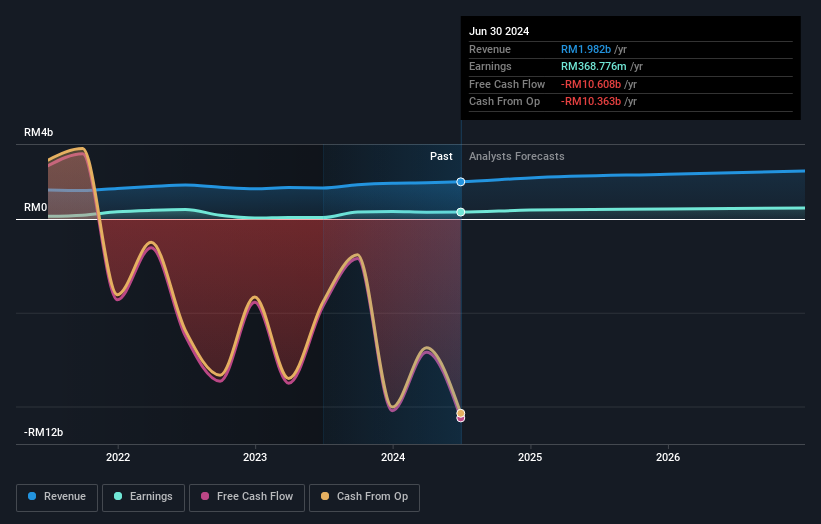Institutional investors control 36% of AFFIN Bank Berhad (KLSE:AFFIN) and were rewarded last week after stock increased 6.9%

Key Insights
- Significantly high institutional ownership implies AFFIN Bank Berhad's stock price is sensitive to their trading actions
- The top 2 shareholders own 53% of the company
- Using data from analyst forecasts alongside ownership research, one can better assess the future performance of a company
To get a sense of who is truly in control of AFFIN Bank Berhad (KLSE:AFFIN), it is important to understand the ownership structure of the business. And the group that holds the biggest piece of the pie are institutions with 36% ownership. That is, the group stands to benefit the most if the stock rises (or lose the most if there is a downturn).
And last week, institutional investors ended up benefitting the most after the company hit RM7.4b in market cap. The gains from last week would have further boosted the one-year return to shareholders which currently stand at 48%.
Let's delve deeper into each type of owner of AFFIN Bank Berhad, beginning with the chart below.
See our latest analysis for AFFIN Bank Berhad

What Does The Institutional Ownership Tell Us About AFFIN Bank Berhad?
Many institutions measure their performance against an index that approximates the local market. So they usually pay more attention to companies that are included in major indices.
As you can see, institutional investors have a fair amount of stake in AFFIN Bank Berhad. This implies the analysts working for those institutions have looked at the stock and they like it. But just like anyone else, they could be wrong. If multiple institutions change their view on a stock at the same time, you could see the share price drop fast. It's therefore worth looking at AFFIN Bank Berhad's earnings history below. Of course, the future is what really matters.

Hedge funds don't have many shares in AFFIN Bank Berhad. Our data shows that Lembaga Tabung Angkatan Tentera is the largest shareholder with 29% of shares outstanding. With 24% and 20% of the shares outstanding respectively, The Bank of East Asia, Limited and Boustead Holdings Berhad are the second and third largest shareholders.
After doing some more digging, we found that the top 2 shareholders collectively control more than half of the company's shares, implying that they have considerable power to influence the company's decisions.
While studying institutional ownership for a company can add value to your research, it is also a good practice to research analyst recommendations to get a deeper understand of a stock's expected performance. There are a reasonable number of analysts covering the stock, so it might be useful to find out their aggregate view on the future.
Insider Ownership Of AFFIN Bank Berhad
The definition of an insider can differ slightly between different countries, but members of the board of directors always count. Management ultimately answers to the board. However, it is not uncommon for managers to be executive board members, especially if they are a founder or the CEO.
I generally consider insider ownership to be a good thing. However, on some occasions it makes it more difficult for other shareholders to hold the board accountable for decisions.
Our most recent data indicates that insiders own less than 1% of AFFIN Bank Berhad. We do note, however, it is possible insiders have an indirect interest through a private company or other corporate structure. Keep in mind that it's a big company, and the insiders own RM62m worth of shares. The absolute value might be more important than the proportional share. It is always good to see at least some insider ownership, but it might be worth checking if those insiders have been selling.
General Public Ownership
The general public-- including retail investors -- own 13% stake in the company, and hence can't easily be ignored. While this group can't necessarily call the shots, it can certainly have a real influence on how the company is run.
Private Company Ownership
Our data indicates that Private Companies hold 21%, of the company's shares. It's hard to draw any conclusions from this fact alone, so its worth looking into who owns those private companies. Sometimes insiders or other related parties have an interest in shares in a public company through a separate private company.
Public Company Ownership
It appears to us that public companies own 25% of AFFIN Bank Berhad. It's hard to say for sure but this suggests they have entwined business interests. This might be a strategic stake, so it's worth watching this space for changes in ownership.
Next Steps:
While it is well worth considering the different groups that own a company, there are other factors that are even more important. To that end, you should be aware of the 1 warning sign we've spotted with AFFIN Bank Berhad .
But ultimately it is the future, not the past, that will determine how well the owners of this business will do. Therefore we think it advisable to take a look at this free report showing whether analysts are predicting a brighter future.
NB: Figures in this article are calculated using data from the last twelve months, which refer to the 12-month period ending on the last date of the month the financial statement is dated. This may not be consistent with full year annual report figures.
New: Manage All Your Stock Portfolios in One Place
We've created the ultimate portfolio companion for stock investors, and it's free.
• Connect an unlimited number of Portfolios and see your total in one currency
• Be alerted to new Warning Signs or Risks via email or mobile
• Track the Fair Value of your stocks
Have feedback on this article? Concerned about the content? Get in touch with us directly. Alternatively, email editorial-team (at) simplywallst.com.
This article by Simply Wall St is general in nature. We provide commentary based on historical data and analyst forecasts only using an unbiased methodology and our articles are not intended to be financial advice. It does not constitute a recommendation to buy or sell any stock, and does not take account of your objectives, or your financial situation. We aim to bring you long-term focused analysis driven by fundamental data. Note that our analysis may not factor in the latest price-sensitive company announcements or qualitative material. Simply Wall St has no position in any stocks mentioned.
About KLSE:AFFIN
AFFIN Bank Berhad
A financial holding company, provides various banking services in Malaysia.
Excellent balance sheet with moderate growth potential.


